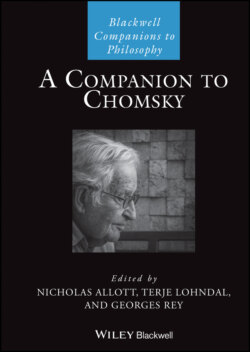Читать книгу A Companion to Chomsky - Группа авторов - Страница 71
7 Language as a Branch of Psychology: Chomsky and Cognitive Science1
ОглавлениеLILA GLEITMAN
Professor Emerita in the Department of Psychology, University of Pennsylvania, Philadelphia, Pennsylvania
Editors' note: Lila Gleitman studied with Zellig Harris in the 1950s, shortly after Chomsky did, and then over the decades since has been a leading proponent of Chomsky's views in psychology, training many of its leading researchers in the field. Her work has been so important and influential in the development of those views there that she was the first person the editors of this volume turned to provide a perspective on that development.
Most of this chapter has been extracted from an article by Professors Gleitman, Mark Y. Liberman, Cynthia A. McLemore, and Barbara H. Partee, “The Impossibility of Language Acquisition (and How They Do It),” which appeared in the Annual Review of Linguistics 2019, 5:17.1–17.24 (online at clinguist.annualreviews.org). Those authors own the copyright, but have granted permission to the present editors to reproduce the portions included here.
Both that article and the present one consist of an autobiographical interview with Professor Gleitman: the style and first‐person voice throughout is hers, and the occasional interpolations in square‐brackets are those of her and the other authors (additions and interpolations in curly brackets are those of the present editors). The three opening paragraphs below and a new section 10 have been added by Professor Gleitman (Section 11 is the original's Section 10). To keep within the word limits, we have omitted the earlier article's Sections 5–9, except for their titles. Professor Gleitman especially thanks Cynthia McLemore, Sharon Armstong, Claire Gleitman, and Mark Liberman, whose aid was crucial in organizing the new material presented here.
*****************
Noam Chomsky, almost single‐handedly, exposed the bankruptcy of radical Behaviorism and its learning theoretic handmaiden, passive associationism, as the explanatory basis for human language learning and knowledge; for the opening discussion in this regard, see his {1959} “Review of Skinner's Verbal Behavior,” which appeared in the journal Language.
Initially, my own vague presupposition about language learning, in common with most scientists as well as laypersons of that time, was that language learning is at bottom an outside‐in procedure, a more or less straightforward function from what is heard to what is known. After all, exposed to English, the English learn English, and exposed to French, the French learn French. This truism accepted, the question remains how the young human mind records, manipulates, and organizes this database. Chomsky's insistence on understanding the class of problems here has played a major role in the emergence of the field now known as Cognitive Science.
Excerpted below is a section of an autobiographical description of the factors that led me from initial empiricist leanings to Chomsky's position emphasizing language as the pinnacle of human cognitive competence.
*****************
This autobiographical article, which began as an interview, reports some reflections by Lila Gleitman on the development of her thinking and her research – in concert with a host of esteemed collaborators over the years – on issues of language and mind, focusing on how language is acquired. Gleitman entered the field of linguistics as a student of Zellig Harris, and learned firsthand of Noam Chomsky's early work. She chose the psychological perspective, later helping to found the field of cognitive science; and with her husband and long‐term collaborator, Henry Gleitman, for over 50 years fostered a continuing research community aimed at answering questions such as: When language input to the child is restricted, what is left to explain language acquisition? The studies reported here find that argument structure encoded in the syntax is key (“syntactic bootstrapping”) and that children learn word meaning in epiphanies (“propose, but verify”).
